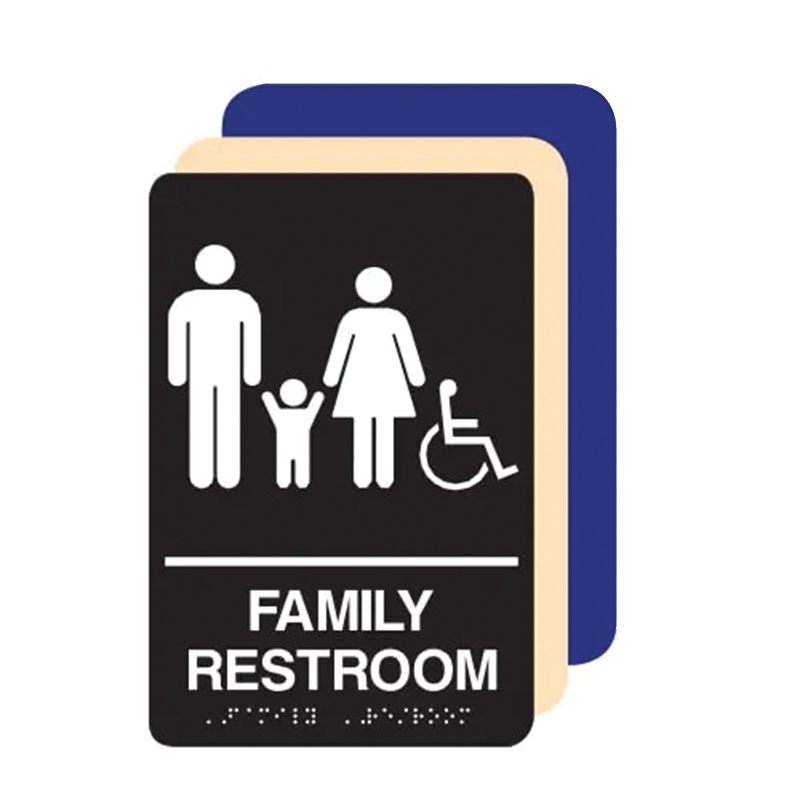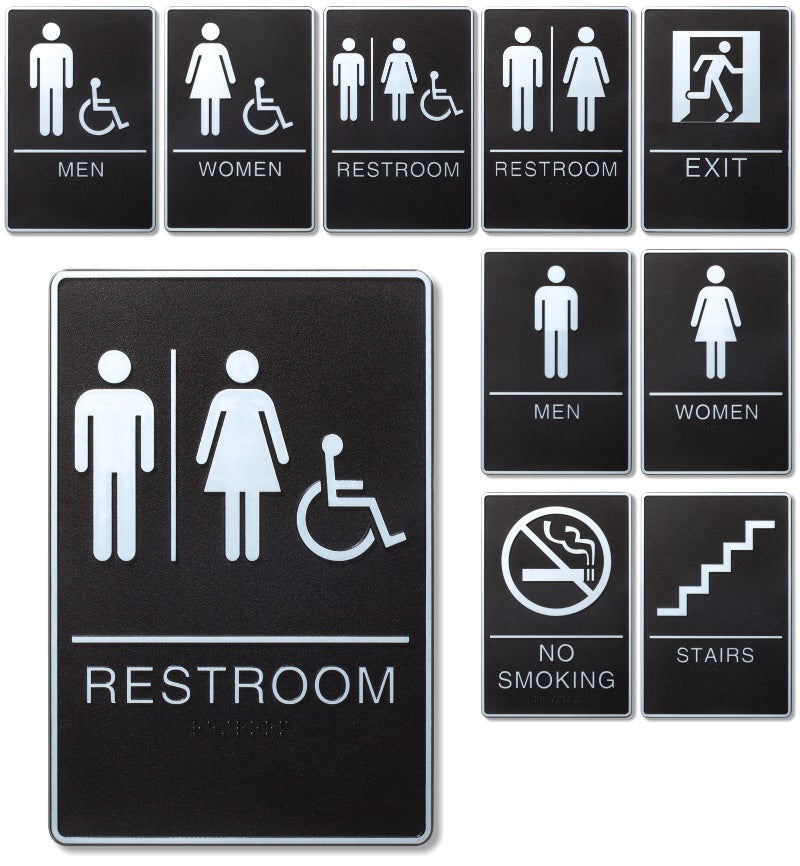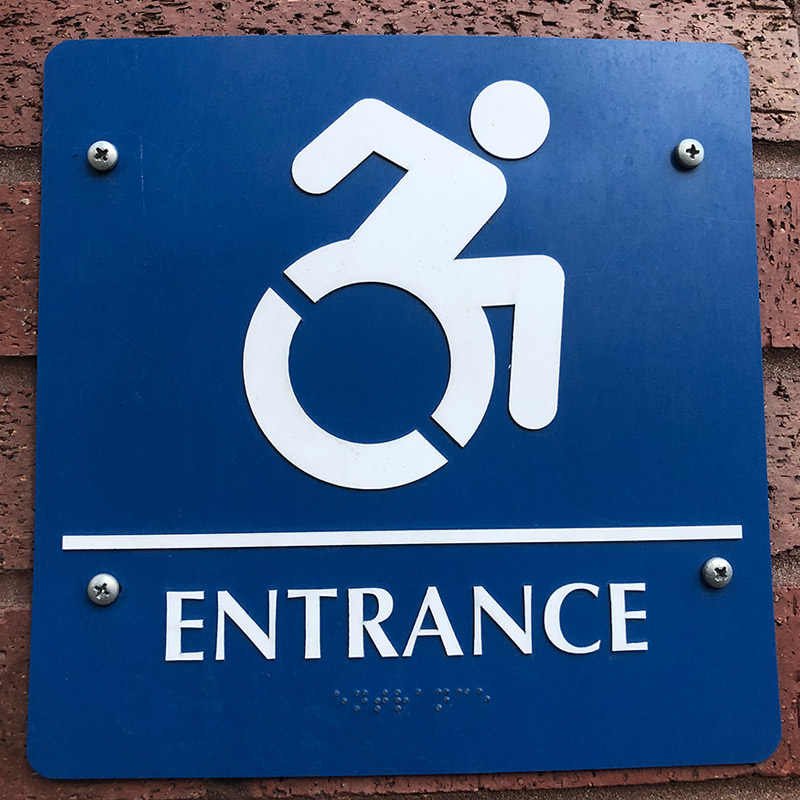Exploring Creative Layouts for Efficient ADA Signs
Exploring Creative Layouts for Efficient ADA Signs
Blog Article
Comprehending the Significance of ADA Signage for Inclusive Environments
In an increasingly varied culture, the relevance of ADA signage can not be overstated. These signs are much more than plain conformity with lawful criteria; they represent a commitment to accessibility and inclusivity in public and exclusive spaces. By integrating features like high-contrast visuals and tactile personalities, ADA signs plays an essential function in making certain equivalent accessibility for people with disabilities. Nonetheless, the advantages prolong past lawful compliance and ease of access. Exactly how do these elements change areas into really inclusive atmospheres, and what ramifications does this have for services and areas devoted to equality?
The Function of ADA Signs
ADA signs plays a vital duty in making certain ease of access and inclusivity in exclusive and public rooms. These signs are necessary in leading people with specials needs, giving them with the necessary information to browse environments separately and safely. The Americans with Disabilities Act (ADA) states particular standards for signage to make sure that people with aesthetic, acoustic, or cognitive disabilities can access the exact same information as those without such obstacles.
The duty of ADA signs prolongs beyond mere compliance with lawful demands; it personifies a dedication to equality and non-discrimination. By implementing ADA-compliant signs, organizations and companies show their commitment to producing environments where every person, no matter their physical capabilities, can participate totally and similarly. This is specifically essential in spaces like hospitals, instructional institutions, and federal government buildings, where access can directly affect a person's wellness and capacity to gain access to vital services.
Moreover, ADA signage adds to the total individual experience by minimizing confusion and enhancing wayfinding for all individuals. Clear, purposefully put signage assists in handling foot web traffic, minimizing blockage, and enhancing safety and security. In significance, ADA signs is a foundation of inclusive design, facilitating an environment where all people can navigate and communicate with their environments properly.
Trick Elements of ADA Signs
Effective interaction is at the heart of ADA signs, which includes a number of key components to ensure access for people with impairments. Among the primary aspects is the use of responsive characters, such as Braille and raised letters, which permit individuals with aesthetic impairments to check out the signs with touch. The Braille must be Grade 2 and placed directly below the equivalent message.

Another essential element is the mounting location and elevation of the indications. ADA regulations define that signs must be mounted at a height that comes to all users, commonly between 48 and 60 inches from the flooring. This makes sure that they are within reach for individuals in wheelchairs or of differing heights.
Benefits for Services and individuals
While guaranteeing access via ADA signs is a legal demand, it additionally provides substantial advantages for both people and businesses. For people, particularly those with handicaps, ADA signage gives vital access to public spaces.
For organizations, the important site application of ADA signs can lead to enhanced customer satisfaction and loyalty. By showing a commitment to accessibility, organizations can draw in a more comprehensive client base, consisting of individuals with specials needs and their family members, who usually seek out comprehensive environments. Furthermore, ADA conformity can protect services from possible lawful challenges and penalties connected with non-compliance, safeguarding their track record and economic security.
Moreover, ADA signage can add to a positive workplace atmosphere. Staff members with handicaps gain from obtainable navigation within their work areas, promoting efficiency and morale (ADA Signs). Ultimately, purchasing ADA signage not just fulfills lawful commitments yet additionally boosts the inclusivity, online reputation, and functional success of services
Typical Kinds Of ADA Signs
When discussing the different kinds of ADA signage, it is essential to comprehend the details types that provide to different access demands. ADA signage is created to guarantee that people with disabilities can browse spaces securely and individually.
Another considerable kind of ADA signage is directional indications. These supply clear advice to different areas within a facility, ensuring that all people, consisting of those with wheelchair impairments, can quickly discover their way - ADA Signs. They often integrate symbols and page high-contrast colors to improve presence and understanding
Informative indicators are additionally vital, offering necessary information regarding centers, such as running hours and policy standards. Furthermore, regulatory indicators communicate compulsory instructions, like "No Cigarette smoking" or "Exit Course," making certain compliance with safety procedures.
Lastly, recognition indications are used to classify rooms and spaces, making it easier for every person, no matter capability, to identify particular areas. These indications typically consist of pictograms to enhance global understanding. Collectively, these typical sorts of ADA signs play a critical duty in developing comprehensive and obtainable atmospheres.

Implementing Effective Signage Solutions
Executing efficient signs options requires a strategic strategy to ensure accessibility and conformity with the ADA requirements. The process starts with a thorough assessment of the center to determine the particular signs needs based on the environment's feature, design, and the population it offers. This assessment needs to include factors to consider for both long-term and short-term signage, each calling for unique layout and placement techniques.
Signs needs to be made from sturdy products to withstand environmental variables while making certain high visibility and legibility. The combination of Braille and raised characters should adhere to ADA specifications to provide equivalent accessibility.
Consistent evaluation and upkeep of signs guarantee ongoing conformity and effectiveness. Engaging with availability specialists throughout the preparation and implementation phases can supply valuable insights, ensuring that signs not only fulfills lawful needs yet additionally boosts the inclusivity of the environment.

Conclusion
ADA signage plays a critical role in developing inclusive environments by making sure compliance with ease of access standards and his explanation improving navigating for all individuals. Key elements such as tactile personalities, high-contrast designs, and proper mounting heights are essential for efficient execution. These elements promote non-discrimination, equal rights, and independence, benefiting both people with impairments and businesses. By fostering much safer and a lot more inviting spaces, ADA signage highlights a dedication to inclusivity, inevitably adding to a much more equitable culture for every person.
By incorporating attributes like responsive characters and high-contrast visuals, ADA signs plays a crucial role in guaranteeing equal access for people with handicaps. The Americans with Disabilities Act (ADA) establishes forth certain standards for signs to guarantee that individuals with visual, acoustic, or cognitive problems can access the same details as those without such obstacles.
Effective interaction is at the heart of ADA signs, which integrates several crucial parts to ensure access for people with handicaps.While ensuring accessibility through ADA signage is a lawful need, it likewise uses significant benefits for both companies and people. ADA signs is made to guarantee that individuals with disabilities can browse areas securely and individually.
Report this page